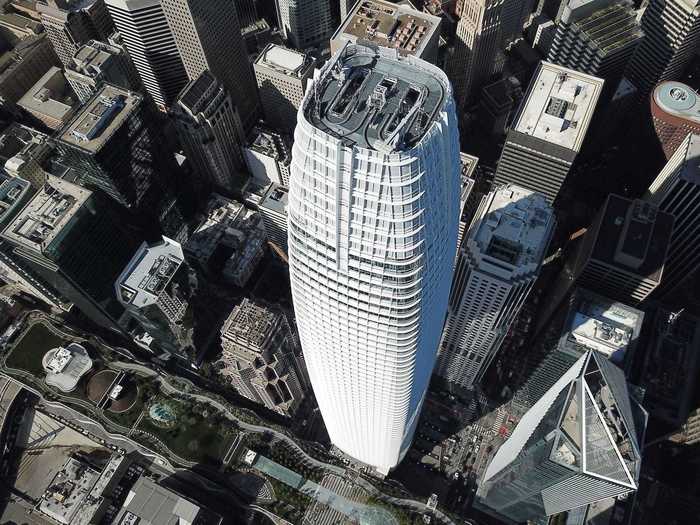
Salesforce's tower in New York City.Erik McGregor/LightRocket via Getty Images
As countries around the world begin gradually reopening businesses in the wake of the coronavirus crisis, tech companies have begun asking: what do offices look like after a pandemic?
While companies like Apple have had employees reporting to the office since May, others, like Twitter and Facebook, have assured employees that while offices may reopen, employees won't be due back for the rest of the year — or longer — if they prefer staying home.
But the tech world still has to decide what to do about the hundreds of thousands of square feet of office space in their portfolios, particularly in places like the San Francisco Bay Area, where companies like Salesforce and Google are based.
In Salesforce's case, the company wrote a 21-page handbook for reopening after closing its doors in March, according to The New York Times' Natasha Singer. Its plan includes rethinking some of the materials inside the office, adding glass dividers, and mandating social distancing, even in elevators.
Here's how major tech companies are thinking about the future of their offices and their plans for sending employees back to work.

Salesforce is making sweeping changes to its offices around the world. Both the San Francisco Chronicle's Roland Li and The Times reported on how Salesforce plans to reopen its offices and bring employees back to work:
The company is also looking at adding glass dividers between desks and surfaces that kill microbes, like copper and brass, the Chronicle reported.
CEO Marc Benioff told The Times Salesforce's offices would be more "sterile" and "hospital-like" and that more light-hearted touches like trinkets on desks and "huge jars of gummy bears everywhere" will be eliminated as well.

Apple started bringing employees back to Apple Park, its Cupertino, California, headquarters, in May. According to Bloomberg's Mark Gurman, the company put rules in place for how to make its offices safer, including:

When Facebook begins allowing some employees to return to work on July 6, it will be at 25% capacity. According to Bloomberg's Mark Gurman and Kurt Wagner, employees who work in divisions like hardware and operations will be asked to return then, as their jobs are more difficult to do remotely.
Facebook is putting strict rules in place for employees returning to the office, including:

Google CEO Sundar Pichai announced last month that employees would start returning to Google's offices on July 6 in a limited capacity. But Google's offices will likely feel drastically different for employees.
Business Insider's Hugh Langley reported on Google's plans for sending employees back to work:
 A centenarian who starts her day with gentle exercise and loves walks shares 5 longevity tips, including staying single
A centenarian who starts her day with gentle exercise and loves walks shares 5 longevity tips, including staying single  A couple accidentally shipped their cat in an Amazon return package. It arrived safely 6 days later, hundreds of miles away.
A couple accidentally shipped their cat in an Amazon return package. It arrived safely 6 days later, hundreds of miles away. Colon cancer rates are rising in young people. If you have two symptoms you should get a colonoscopy, a GI oncologist says.
Colon cancer rates are rising in young people. If you have two symptoms you should get a colonoscopy, a GI oncologist says. Having an regional accent can be bad for your interviews, especially an Indian one: study
Having an regional accent can be bad for your interviews, especially an Indian one: study
 Dirty laundry? Major clothing companies like Zara and H&M under scrutiny for allegedly fuelling deforestation in Brazil
Dirty laundry? Major clothing companies like Zara and H&M under scrutiny for allegedly fuelling deforestation in Brazil
 5 Best places to visit near Darjeeling
5 Best places to visit near Darjeeling

Copyright © 2024. Times Internet Limited. All rights reserved.For reprint rights. Times Syndication Service.